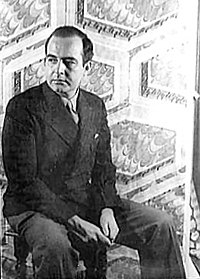Samuel Barber
| Samuel Barber | |
|---|---|
| Фотография от Каръл Ван Вехтен | |
| Nascimento | Samuel Osmond Barber II 9 de março de 1910 West Chester |
| Morte | 23 de janeiro de 1981 (70 anos) Manhattan |
| Cidadania | Estados Unidos |
| Progenitores |
|
| Alma mater |
|
| Ocupação | compositor, musicólogo, pianista |
| Prêmios |
|
| Obras destacadas | Cello Concerto, Adagio for Strings, Agnus Dei, Violin Concerto, Antony and Cleopatra, Capricorn Concerto, Hermit Songs, Knoxville: Summer of 1915, Medea's Dance of Vengeance, Piano Concerto, Piano Sonata, Prayers of Kierkegaard, Second Essay, String Quartet, The School for Scandal, Third Essay, Vanessa, The Lovers |
| Instrumento | piano |
| Causa da morte | câncer |
| Assinatura | |

| |
Samuel Osborne Barber II (West Chester, 9 de Março de 1910 — Nova Iorque, 23 de Janeiro de 1981) foi um compositor norte-americano de música erudita.[1][2]
Uma de suas obras mais conhecidas é "Adagio for Strings". Começou a compor com sete anos de idade; os seus estudos formais foram feitos no "Instituto de Música Curtis", em Filadélfia. Aos 25 anos tornou-se membro da Academia Americana em Roma.[3]
Compôs o conhecido "Concerto para Violino" Opus 14 sendo este interpretado pelo grande violinista Isaac Stern, e a obra "Music for a Scene from Shelley", Opus 7, esta última baseada num poema de Percy Bysshe Shelley. É o autor de um Concerto para Piano e Orquestra e de uma Sonata para Piano. Sua ópera "Vanessa" (1957) ganhou o Prémio Pulitzer de Música.[4] Em 1963 voltou a receber o Prémio por Piano Concerto.[2]
Referências
- ↑ Henahan, Donal (24 de janeiro de 1981). «Samuel Barber, Composer, Dead; Twice Winner of Pulitzer Prize». The New York Times (em inglês). ISSN 0362-4331
- ↑ a b Wentzel, Wayne (2010). Samuel Barber: A Research and Information Guide (em inglês). [S.l.]: Routledge. p. 15-19
- ↑ «String Quartet (Samuel Barber)». Hollywood Bowl (em inglês). Consultado em 30 de junho de 2020
- ↑ «Vanessa, by Samuel Barber» (em inglês). Pulitzer. Consultado em 29 de junho de 2020
Text is available under the CC BY-SA 4.0 license; additional terms may apply.
Images, videos and audio are available under their respective licenses.

